How Companies Use Customer Reviews to Get Better

Customer reviews are the new word-of-mouth advertising in the modern digital economy. Before making a purchase, potential customers frequently rely on them to evaluate goods, services, and brands. Research consistently demonstrates that they are a significant source of credibility and trust, carrying the same weight as suggestions.
For organizations, reviews aren’t just about deciding consumer perceptions. They can reflect operational strengths, draw attention to service gaps, and provide enlightening observations on consumer expectations. Invoking reviews can propel business growth, product quality improvement, and enhance customer satisfaction.
This article discusses organizational strategies to engage customer reviews to better performance, reputation, and long-term success, showing why every review is an opportunity, even negative reviews.
What Are Customer Reviews?
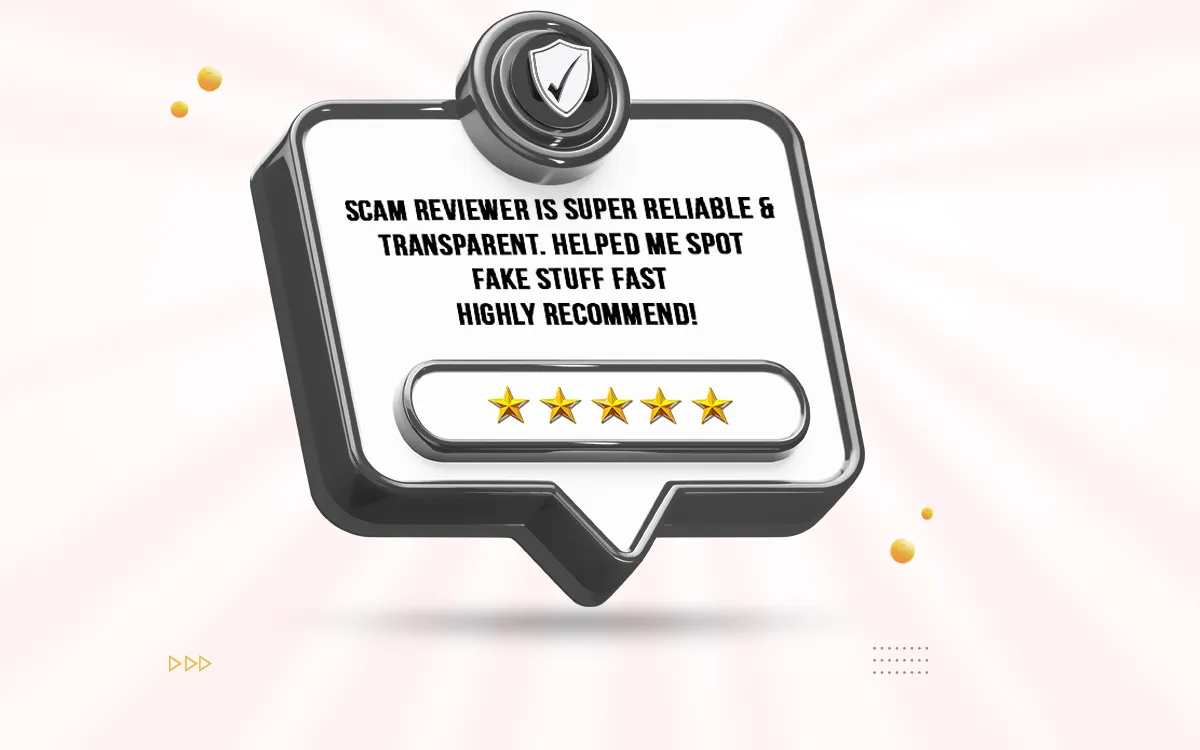
A customer review is a written opinion by a buyer describing their experience with a product, service, or brand. Customer reviews often appear on websites/portals like Google Customer Reviews, Trustpilot, and Yelp, but can also be on a business’s website.
Customer reviews have become a significant part of the decision process for today’s buyer and influence how people understand and engage with reviews about businesses in any industry.
Why Do Customers Write Reviews?
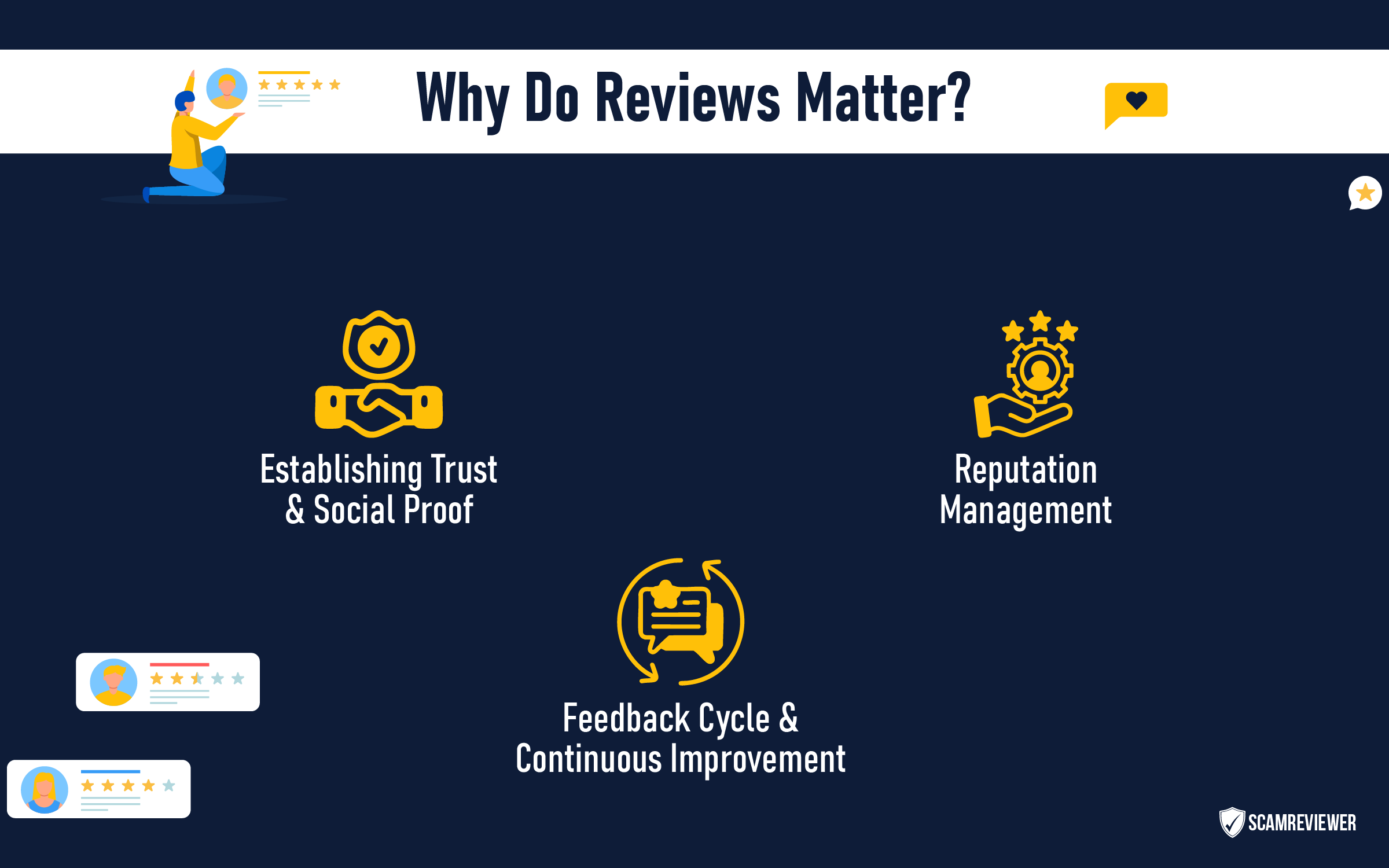
The reasons why customers choose to post reviews about a company can generally be grouped into a few common motivations
- Sharing good experiences to help others make their purchase decisions.
- Alerting potential buyers about bad service or their bad experiences with products.
- Providing feedback that helps organizations improve.
- Seeking recognition or simply having their voice heard by a company.
In addition to influencing purchase decisions, the option for reviews gives valuable insight into client satisfaction. Not only do reviews reflect how well products or services perform in the real world, but they also often highlight issues that companies may not have found or addressed internally.
Strategic Value of Company Reviews for Businesses
Customer reviews are a significant factor in establishing trust and building credibility when engaging with new customers. Customer reviews provide insight into how the quality of products, services, and operations affects customer satisfaction. The positive and negative comments create a feedback loop to facilitate improvements and increase growth.
- Reviews provide the benefits of online reviews for your business by providing credibility and trust with new customers.
- They provide transparent information regarding how reviews impact the performance of a business, and if operations, customer service, delivery to customers, or product quality happen.
Reviews play a major role in influencing how customers interact with a brand, make purchasing decisions, and contribute to a company’s overall return on investment. Understanding these metrics helps businesses connect feedback with measurable outcomes.
How Do Companies Use Customer Reviews to Get Better?
When ratings reviews of consumer products shape reputation and growth. It is no longer optional to obtain online reviews for your business and be able to analyze them. It is now a strategic necessity.
| Customer Motivation | Business Benefit |
| Share positive experiences | Builds brand reputation through customer reviews for businesses |
| Warn others about negative experiences | Highlights operational weaknesses for timely improvement |
| Provide constructive feedback | Enables how companies turn reviews into improvements |
| Gain recognition or feel heard | Strengthens trust and fosters long-term loyalty |
Why Do Reviews Matter?
A customer review is much more than a star rating; it shapes how a business is seen online.Company reviews are significant decision-making tools that shape first impressions, build trust, and lead customers to make decisions.
1. Establishing Trust & Social Proof
- More than 90% of customers read online reviews of companies before making a purchasing decision.
- Positive business reviews act as digital word-of-mouth to build credibility and convince potential new buyers to buy from you.
- Verified reviews, such as Google Customer Reviews, often carry more weight than your marketing messages from the brand.
2. Reputation Management
- Positive reviews help you take advantage of the upside of online reviews and make it easier to attract new customers.
- Businesses that acknowledge negative reviews show responsibility, understand transparency, and have the capacity to improve.
- Businesses that understand how reviews impact business performance and adjust their business around managing feedback are at the next level of managing their reviews.
3. Feedback Cycle & Continuous Improvement
- Reviews offer measurable customer satisfaction metrics, providing organizations with direct insights into what’s going well and what needs adjustment.
- Negative feedback provides the organization with blind spots, while positive reviews validate strategies.
- This feedback cycle demonstrates how companies use customer reviews to get better and why customer feedback is an important aspect for companies’ sustainable growth.
Impact of Customer Reviews on Business Performance
| Factor | With Reviews | Without Reviews |
| Customer Trust | Builds faster through social proof | Harder to gain |
| Conversion Rates | Higher with positive reviews | Lower, as buyers hesitate |
| Brand Reputation | Strengthens with transparency | Weakens due to lack of proof |
| Customer Retention | Higher with engagement in reviews | Lower without feedback mechanism |
How to get online reviews for your business?
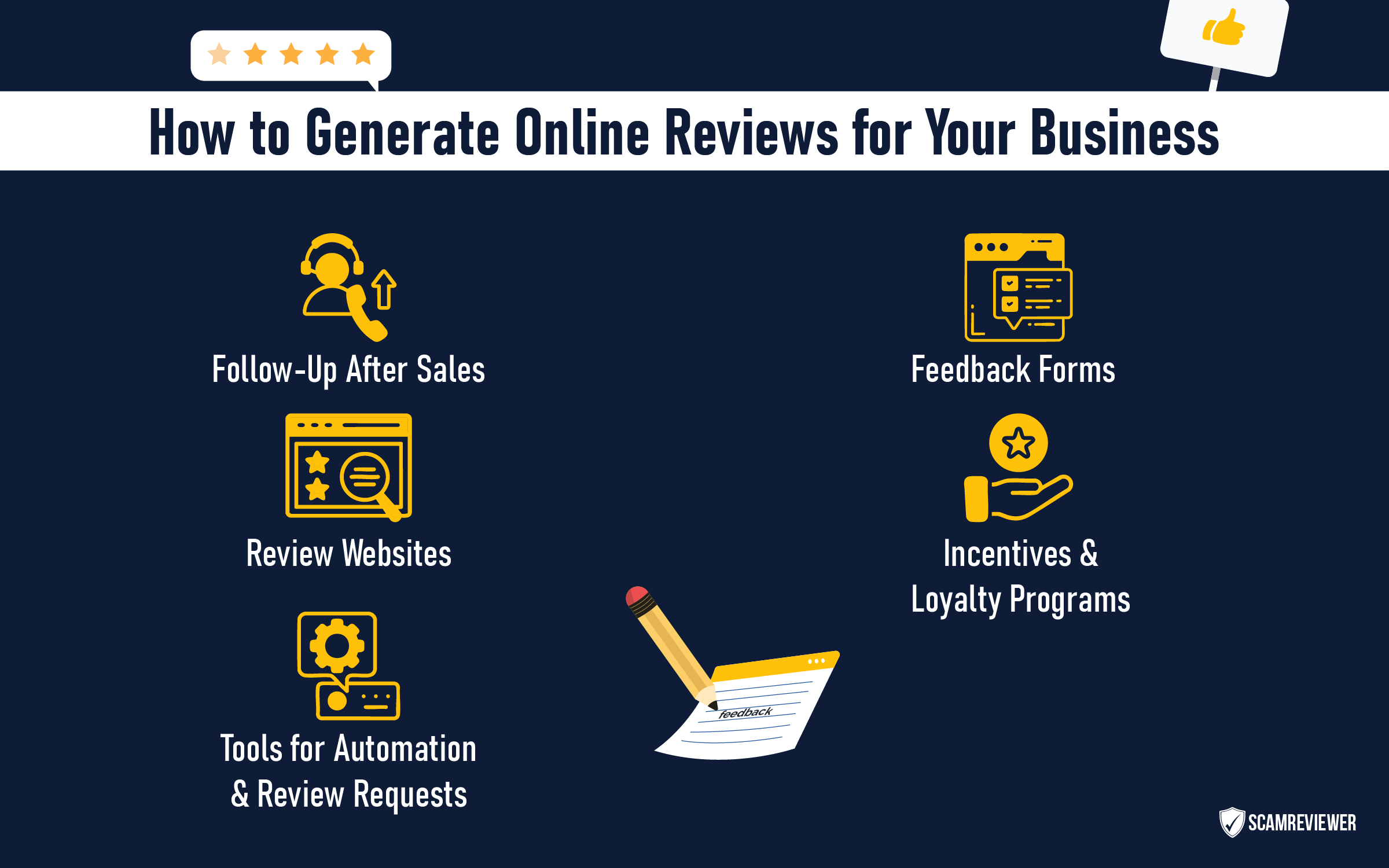
Gathering customer testimonials and reviews is an important way to develop trust, enhance operations, and attract new buyers. Considering reviews from companies can affect purchase decisions, companies need to have processes in place to consistently gather online reviews from their business.
Common Strategies to Collect Reviews
1. Follow-Up After Sales
- Companies frequently send follow-up emails or SMS messages reminding customers to provide a review.
- This method allows businesses to easily collect authentic customer reviews shortly after the experience.
2. Feedback Forms
- Surveys or feedback forms that occur after purchase are an easy way to find out what customers think, for measuring customer satisfaction metrics.
- They provide insights into how reviews impact business success by exposing customer sentiment about products, services, and support.
3. Review Websites
- Potentially popular review sites, such as Google Customer Reviews, Trustpilot, and Yelp, can be acceptable sources of thinking for buyers.
- Using these approaches is a way to showcase the things online reviews do for your business, as reputable sites receive more credibility.
- Several companies are also training their support teams to perform google reviews customer support so they produce more “good” thinking.
4. Incentives & Loyalty Programs
- Discounts, loyalty points, and/or exclusive offers can persuade your customers to think about leaving reviews.
- Incentives should not motivate dishonesty in thinking.
- Expect an increase in participation, and an opportunity to develop a trending custom review, as the custom review will help produce visibility on-line.
5. Tools for Automation & Review Requests
- Current tools assist organizations in obtaining more online reviews for their business with automated review request scheduling.
- Automation takes the friction out of the review process and improves response rates in consumer survey reviews. This means it is easier to efficiently collect ratings and reviews.
- As the process becomes easier, customers are more likely to provide feedback. For example, brands that spell out how to ask a customer for a Google review or provide one-click review links see significantly higher engagement than brands that do not.
How Companies Analyze Customer Reviews?
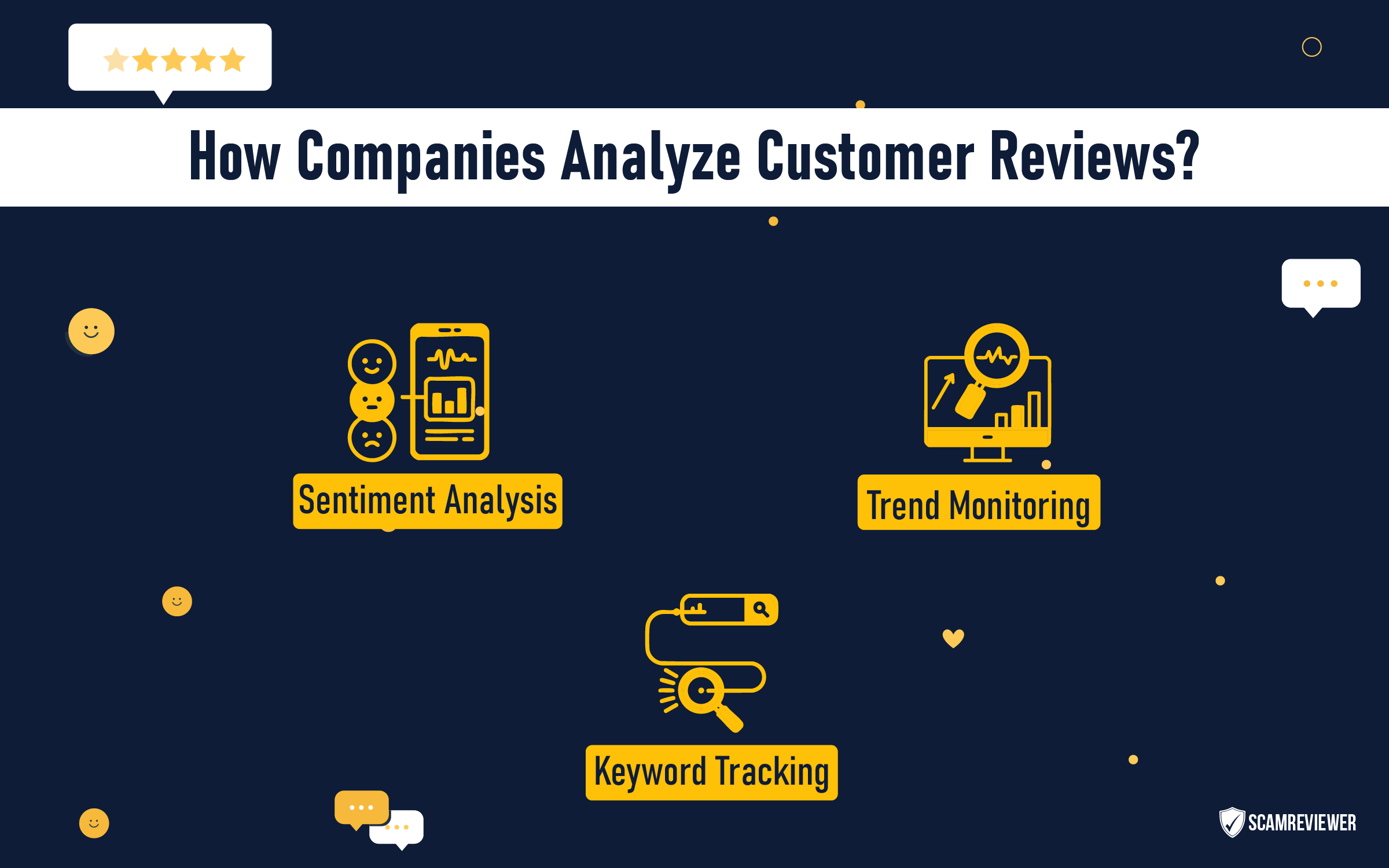
Gathering a customer review is just the beginning of a stronger business. The value comes from writing the review and analyzing it, looking for all patterns and opportunities, and understanding how reviews affect business performance. When reviews are analyzed thoroughly, the information gives companies actionable intelligence that will allow them to adapt and improve.
Common Analysis Methods
1. Sentiment Analysis
- The reviews are evaluated to see if they are positive, negative or neutral.
- The measurement is valuable to reflect customer sentiment overall, as well as the basis for a customer satisfaction measure.
2. Trend Monitoring
- Businesses monitor for repeated issues such as delayed deliveries or product flaws that emerge regularly online in reviews of businesses.
- Recognizing those trends identifies how companies turn reviews into improved processes to mitigate long-term complaints.
3. Keyword Tracking
- Advanced tools reveal the common phrases and words used in reviews.
- This methodology can provide organizations with an understanding of why customer feedback assists companies in advancing because it shows prevalent compliments (e.g. “great support”) or condemnations (e.g., “slow delivery”).
Strategic Benefits of Review Analysis
- Offers your business the value of online reviews by converting feedback into usable plans of action.
- Gives companies more insight into consumer product rating reviews to enhance reputation and conversions.
- Shows how companies at every level utilize customer reviews to improve through innovation and thoughtful decision-making.
Review Analysis in Action
| Review Feedback Example | Business Insight Gained | Action Taken |
| “Love the product, but delivery was slow.” | Logistics delays affect customer happiness | Improve the supply chain or partner with faster couriers |
| Customer service was so helpful. | Strong asset in Google reviews for customer service | Invest more in training and expand support coverage |
| “The app keeps crashing.” | Technical issues with the digital product | Allocate resources to app development |
Review analysis helps companies better understand how some businesses take advantage of customer reviews to improve their businesses, not just to make existing customers happy, but also to build trust with potential customers.
Turning Customer Feedback into Actionable Improvements
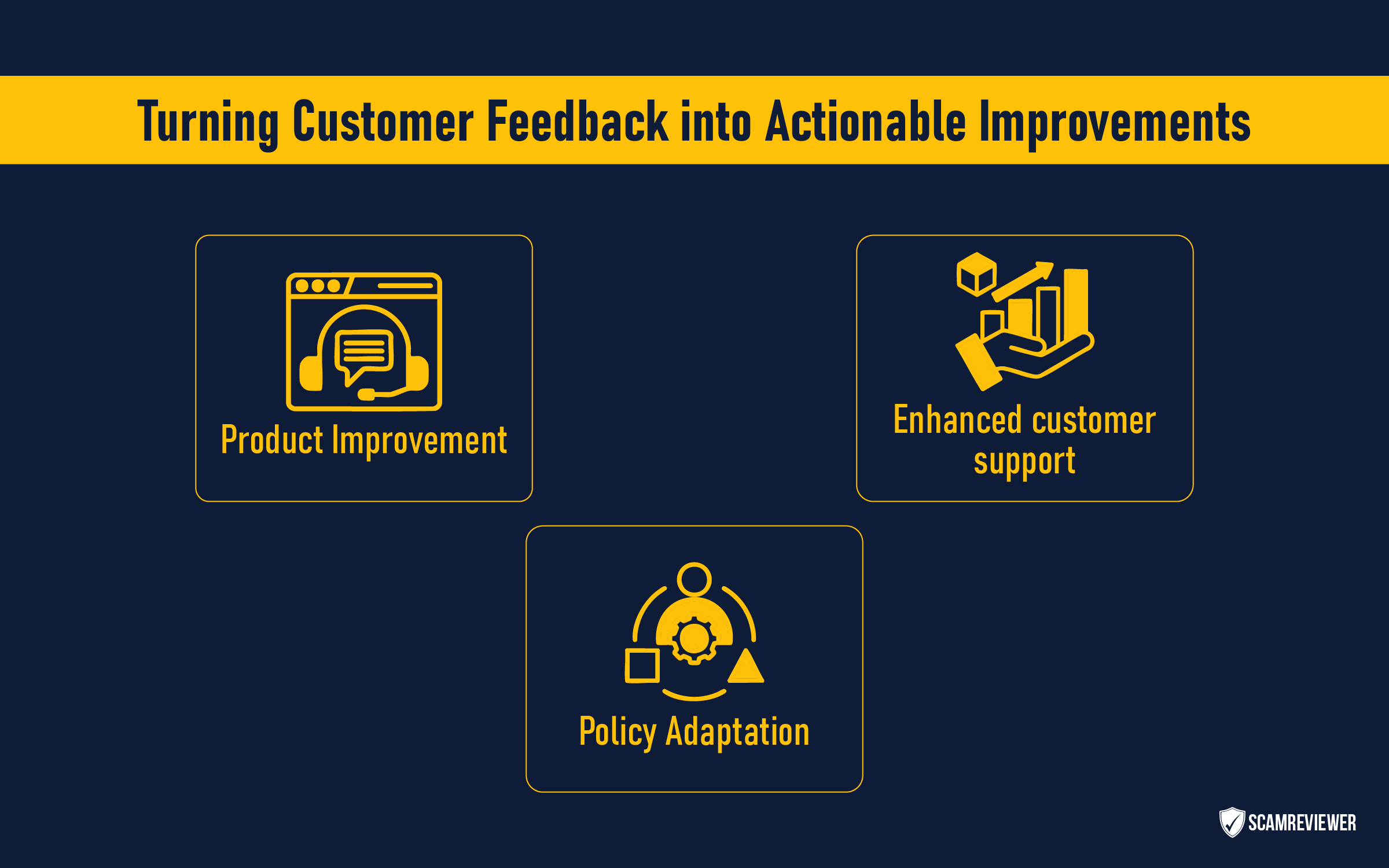
The best organizations treat every customer review as a chance to improve. Instead of simply viewing the reviews as static commentary, the most successful organizations utilize reviews to improve their operations, improve their offerings, and improve customer relationships.
This is an important way to demonstrate how organizations use customer reviews to improve, and also how customer feedback helps organizations grow.
1. Product Improvement
- Implementing frequently requested customer features will lessen the gap and ensure that the business continues to meet market demand.
- Addressing customer complaints around packaging, usability, or durability will lead to better quality and customer satisfaction.
- Continual adjustments based on consumer product ratings and reviews will give organizations the opportunity to improve value and relevance on a consistent basis.
2. Enhanced Customer Support
- Empowering teams to review and respond to recurring issues related to service will improve customer experience significantly.
- Using customer service feedback from Google reviews helps organizations sharpen their focus on gaps identified and improve customer service interactions at the front line.
- Proactively addressing common issues in reviews demonstrates accountability and reminds organizations why reviews matter when building a reputation.
3. Policy Adaptation
- Implementing flexible return or exchange policies as a result of reviews highlighting customer dissatisfaction leads to greater customer trust overall.
- Alterations in pricing structures or subscription levels based on customer perceived value are evident in reviews over time, illustrating how reviews can be used as a metric for business performance.
- In conclusion, businesses that can quickly pivot based on patterns identified in company reviews gain a clear advantage.
Building Trust & Loyalty Through Reviews
A customer review is about more than simple feedback; it’s a conversation between a business and its audience. When a company takes the time to respond to a review, either thanking or addressing a reviewer’s concerns, then that company demonstrates a commitment to transparency, accountability, and long-term perspective. This demonstrates the importance of reviews and how companies can turn reviews into better business practices.
Why It’s Important to Respond
- Recognizing client reviews demonstrates that you value their perspectives.
- Restoring confidence and demonstrating how reviews affect corporate performance are two benefits of addressing concerns.
- Positive responses boost visibility and credibility by encouraging more individuals to leave online evaluations for your company.
Transparency & Accountability
- Responses to Google customer reviews show the public’s responsibility and openness.
- Addressing bad reviews directly shows you can be trusted and reinforces the value of reviews to your business.
- Businesses that hold this level of honesty usually have high customer satisfaction ratings.
Building Relationships
- Responding to online ratings for businesses can make customers feel noticed, respected, and valued.
- Responses to individual consumer product ratings can turn a casual customer into a loyal supporter.
- Ongoing engagement is why the customer perspective matters and can result in company growth and brand loyalty over time.
Always thank customers for sharing their experiences. Even a negative review is an opportunity to show empathy, professionalism, and a human touch.
The Future of Online Reviews for Business
Changes in customer reviews are happening quickly, and those who embrace these changes will have a clear advantage over their competitors. From AI-driven insights to new authentic content formats, the future of online review content for businesses is clear: it will have greater trust and transparency than previously was the case.
- AI Sentiment Analysis- Companies use AI to study the company reviews, time negative trends, and improve customer satisfaction scores.
- Immediate Alert for Feedback- Automated systems for reviews provide alerts as to how a company uses customer reviews to better themselves, so a speedy response and better service are certain.
- The Age of Video Reviews- Due to the demand for trending custom reviews, especially authentic video testimonials and influencer endorsements, the systems of reviews affecting business performance are undergoing a complete makeover.
- Verified Reviews for Credibility- With fake reviews rising, verified Google customer reviews and the credible platforms of Yelp or Trustpilot are becoming a must-have for credibility.
- Stronger business benefits- Genuine consumer product ratings and reviews put online reviewing benefits to work for your business, resulting in better visibility, reputation, and conversion.
Reviews Drive Business Performance
Customer reviews have turned out to be one of the most influential factors in determining business performance. A customer review, aside from the decision of purchasing or not, guides product development, service policies, prices, and even the reputation of the brand. Companies that solicit, analyze, and respond to reviews enjoy greater trust, higher customer satisfaction scores, and long-term loyalty support.
Anonymous feedback is the most helpful, whether it is Google Customer Reviews, video testimonials, or verified consumer product rating reviews. It provides the whole understanding and gives you a workable advantage in the market. Your business will receive some benefits in the form of online reviews, such as more visibility, more significant trust, and continued growth.
How do companies use reviews to improve products?
- Companies study consumer product ratings reviews to identify product strengths and weaknesses.
- Tracking customer satisfaction metrics helps discover flaws, usability issues, or missing features.
- This is how companies turn reviews into improvements by updating products, refining packaging, or adding features that customers request.
- Customer feedback helps companies grow and stay competitive in their market.
Do negative reviews actually help businesses?
- Negative reviews can reveal blind spots that positive reviews don’t show.
- Businesses that respond to critical reviews display accountability and transparency.
- Reviews impact business performance by highlighting gaps in delivery, service, or product quality.
- Addressing concerns publicly shows why reviews matter and builds stronger customer loyalty.
What tools do companies use to analyze reviews?
- Businesses use sentiment analysis to measure whether reviews are positive, neutral, or negative.
- Trend monitoring helps spot recurring problems like late deliveries or product flaws.
- Keyword tracking reveals common themes in company reviews, such as “great support” or “slow service.”
- AI-driven platforms process Google Customer Reviews, Yelp, or Trustpilot data to show how reviews impact business performance.
Can reviews influence customer loyalty and trust?
- Verified Google Customer Reviews and trending custom reviews carry more weight than marketing messages.
- Engaging with reviews through Google reviews customer service makes customers feel valued.
- Knowing how to ask a customer for a Google review or how to get more online reviews for your business increases engagement.
- Continuous interaction with reviews builds trust, loyalty, and long-term repeat sales.
